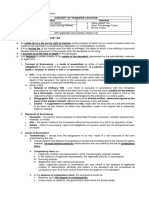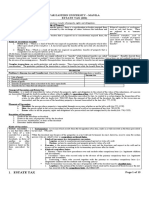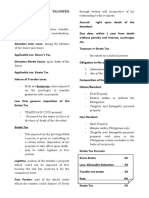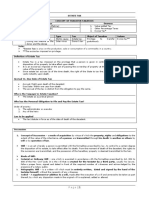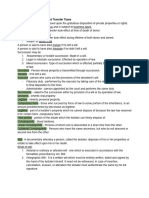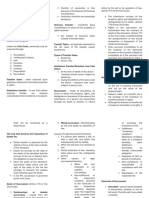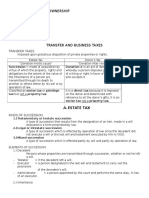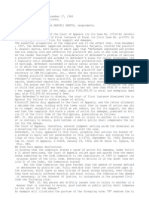0 ratings0% found this document useful (0 votes)
1 viewsTransfer Tax (Notes)
Transfer Tax (Notes)
Uploaded by
Yui AyuzawaCopyright:
© All Rights Reserved
Available Formats
Download as PDF, TXT or read online from Scribd
Transfer Tax (Notes)
Transfer Tax (Notes)
Uploaded by
Yui Ayuzawa0 ratings0% found this document useful (0 votes)
1 views3 pagesCopyright
© © All Rights Reserved
Available Formats
PDF, TXT or read online from Scribd
Share this document
Did you find this document useful?
Is this content inappropriate?
Copyright:
© All Rights Reserved
Available Formats
Download as PDF, TXT or read online from Scribd
Download as pdf or txt
0 ratings0% found this document useful (0 votes)
1 views3 pagesTransfer Tax (Notes)
Transfer Tax (Notes)
Uploaded by
Yui AyuzawaCopyright:
© All Rights Reserved
Available Formats
Download as PDF, TXT or read online from Scribd
Download as pdf or txt
You are on page 1of 3
TRANSFER TAX Testator – if a decedent left a will.
Executor – a person designated in the last will &
OBJECTS OF TAXATION testament to carry out the provisions of the
Persons decedent’s will.
- Residence *responsible for distributing the properties according
- Personal tax / CTC to the will
*Personal Tax – toll tax, sedula, community tax Administrator – a person appointed by the court
Property and performs the same duty if executor refused
- Real/Personal Property to accept the appointment. (normally lawyers)
- Real Property Tax (tax on property itself, paid INHERITANCE (ESTATE)
by the owner)
Others - All property, rights and obligations of a person
- Income – income tax (tax imposed to the which are not extinguished by death and all
income itself, not to the person) which have accrued thereto since the opening of
- Transactions – Business Transactions / succession. (subject to succession)
Business Tax (Value-Added Tax, OPT, and SUCCESSOR
Excise Tax)
- Privilege – transfer tax (donor’s tax, estate - A person who is called to the succession wither
tax) the provision of a will or by operation of law
*tax on privilege to transfer property. - Devisees and legatees are persons to whom
gifts of real and personal property are
TRANSFER TAX respectively given by virtue of a will.
- Taxes imposed upon the gratuitous disposition *receives the inheritance
of private properties or rights.
COMPULSORY
*Gratuitous – transfer without asking for anything in - Those who succeed by force of law to some
exchange portion of the inheritance, in an amount
Donations predetermined by law, known as the legitime.
- Donation inter vivos – DONOR’S TAX *cannot be deprived of their inheritance by law
*transferring property while you are still alive
- Donation mortis causa – ESTATE TAX *Legitime – percentage of property designated by
*transfer of property on the death of the law for the compulsory heirs (75%); only applies if
donor there is a will
*hindi pwedeng paghati-hatian ng mga VOLUNTARY
tagapagmana ang estate hanggat hindi nagbabayad - Those instituted by the testator in his will to
ng estate tax succeed to the inheritance of the portion
thereof of which the testator can freely
SUCCESSION DEFINED dispose. (after distributing the legitime of
- A mode of acquisition by virtue of which the compulsory heirs; can also be a compulsory
Property, Rights and Obligations to the extent heir)
of the value of the inheritance, of a person are LEGAL/INTESTATE
transmitted through his death to another or - Those who succeed to the estate of the
others either by his will or by operation of law. decedent by operation of law (heirs who will
- The rights to the succession are transmitted from inherit without a will, based on family
the moment of the death of the decedent. relations)
*Process of transferring assets from the deceased to COMPULSORY
their heirs.
Primary
ELEMENTS OF SUCCESSION a. Legitimate children and their legitimate
descendants
1. Decedent b. Surviving spouse
2. Inheritance (Estate) c. Illegitimate children and their descendants,
3. Successor legitimate or illegitimate
a. Compulsory Heirs Secondary
b. Voluntary Heirs d. Legitimate parents and legitimate
c. Legal or Intestate Heirs ascendants. (They inherit only in default of
DECEDENT “A”)
e. Illegitimate parents (no other descendants).
*Person who passed away; source of inheritance They inherit only in default of “A” and “C”
*Secondary heirs will only inherit if there are no The amount of liability to be assumed by the heir(s)
primary heirs. shall be limited only to the extent of the value of
properties and rights inherited.
NOTE: Brothers and sisters are neither compulsory
heirs nor strangers. However, they may be voluntary *The remaining 2M will not be uncollectible. The
heirs. creditor cannot go after Ryan’s personal assets to
collect the liability. The creditor will bear the loss.
ACCRUAL VS PAYMENT OF TAX
KINDS OF SUCCESSION
The estate tax accrues from the time of death;
while the payment of the estate is at the time the Testamentary or Testate Succession
estate tax return is filed, which is 1 year from the - A type of succession that results from the
date of the decedent’s death, except in cases designation of an heir, made in a will
when extension are granted by the Commissioner or executed in the form prescribed by law.
when installment payment of the estate tax is Legal or Intestate Succession
allowed. - A type of succession which is effected by
operations of law since the decedent did not
*If estate tax is not paid, the property cannot be
execute a will or if the last will & testament
disposed or enjoyed by the heirs. There is no
executed by him is void.
transfer of ownership.
Mixed Succession
*There will also be penalties, which will accumulate - A type of succession which is effected by
through interest if not paid on time (1 year). operations of law since the decedent did not
execute a will or if the last will & testament
*Can be extended through request on BIR, there executed by him is void. A type of succession
should be valid reason and submit an evidence to which is effected partly by “will” and partly by
support the reason.
operation of law. (There is a will but there are
ILLUSTRATION: properties that are not covered by the will,
which will be based on the operations of law.)
Isabelle suffered a heart attack causing her death on
November 1, 2024. Her estate is composed of the QUESTION: What happens to your legal heirs if you
following: decide to leave everything to your friend under a
testamentary or testate succession?
Cash in bank P1,000,000
Commercial building 5,000,000 The compulsory heirs have their legitime, which is
Cars 1,000,000 protected by the law. You can leave inheritance to
House and Lot 3,000,000 anyone you want only up to certain point.
Regardless of what is written in the will, the
Ryan is the only heir of Isabelle. Her remains were compulsory heirs will still receive their rightful share.
cremated on November 8, 2024. The executor of
TESTAMENTARY OR TESTATE SUCCESSION
Isabelle’s estate filed the estate tax return and paid
the corresponding estate tax on April 30, 2025. The - A type of succession that results from the
properties left by the decedent were finally designation of an heir, made in a will executed in
distributed to Ryan on June 30, 2025. the form prescribed by law.
Deadline: Nov. 1, 2025 KIND OF WILLS
When will the transfer of ownership from the 1. Notarial / Ordinary / Attested Will
decedent to the heir take effect?
Requisites for a Valid Notarial Will
November 1, 2024
a. Must be in writing and executed in a language or
The rights to succession are transmitted from the dialect known to the testator
moment of death of the decedent, notwithstanding b. Must be subscribed at the end thereof by the
the actual transfer dated June 30, 2025. testator himself (signature at the end)
When should the estate tax accrue? c. Must be attested and subscribed by three or
more credible witnesses in the presence of the
November 1, 2024 testator and of one another.
Under the TRAIN Law, the filing of the estate tax *Notary public approved.
return is within one (1) year from date of death.
2. Holographic Will
Assume that Isabelle’s’ total outstanding
A written will which must be entirely written, dated
liabilities as of the time of her death amounted to
P12,000,000, how much of the outstanding and signed by the hand of the testator himself.
liabilities of the decedent should be assumed by Codicil – a supplement or addition to a will,
Ryan? made after the execution of a will and annexed
P10,000,000 to be taken as a part thereof. (P.S.)
QUESTION: Can an alien, who is in abroad, have a 4. Refusal without justifiable cause to support
will which produces effect in the PH? the testator who disinherits such heir.
Yes, foreign will. *Inheritance is not just about wealth but also about
values and respect to the family.
As long as it follows the conflict of law rules between
the countries. It should be legal on the country in *The rights to inherit comes with responsibilities.
which the will is created.
RIGHT OF REPRESENTATION
May a will be revoked?
*If the heir died before the testator, they will be
Yes, a will may be revoked by the testator at any time represented by their children.
before his death. Any waiver or restriction of this
right is void. The law further provides that “representation” is
not available to:
MODES OF REVOKING A WILL 1. As to compulsory heirs: In case of
repudiation, the one who repudiates
1. By implication of law (automatically due to legal
(rejected) his inheritance cannot be
processed)
represented. Their own heirs inherit in their
2. By some will, codicil, or other writing executed as
own right.
provided in case of wills
2. As to voluntary heirs
3. By burning, tearing, cancelling, or obliterating the
3. Voluntary heirs, legatees and devisees
will with the intention of revoking it. (dramatic
who:
approach of physical destruction)
a. Predecease the testator
*As long as it is clear that the testator has the b. Renounce the inheritance cannot be
intention to revoke the will. represented by their own heirs, with
respect to their supposed inheritance.
DISINHERITANCE Right of representation takes place only in favor
It is a testamentary disposition by which a of children of brothers or sisters, whether full or
compulsory heir is deprived of, or excluded from the half blood and only if they concur with at least
inheritance to which he has a right. (cutting off the one uncle or aunt. (back up)
heir) This rule applies only when the decedent does
not have descendants.
Requisites:
LEGAL OR INTESTATE SUCCESSION
1. Effected only through a valid will
2. For a cause expressly stated by law Causes of Legal Succession or Intestacy
3. Cause must be stated in the will itself (reason
1. If a person dies without a will, or with a void will,
must be stated)
or one which has subsequently lost its validity
4. Cause must be certain and true 2. When the “Will” does not institute an heir
5. Unconditional 3. Partial institution of heir. Consequently, intestacy
6. Total
takes place as to the undisposed portion.
7. The heir disinherited must be designated in such
a manner that there can be no doubt as to his
identity. (clearly stated)
*Revocation and disinheritance are both in the
control of the testator.
COMMON CAUSES OF DISINHERITANCE
*serious offenses
*it legally affects the legitime or share of a legally
entitled heir.
1. When the heir has been found guilty of an
attempt against the life of the testator, his/her
descendants/ascendants, and spouse.
2. When the heir has accused the testator of a
crime for which the law prescribes imprisonment
for 6 years or more, if the accusation has been
found groundless (false accusation)
3. When the heir by fraud, violence, intimidation
or undue influence causes the testator to make
a will or to change one already made
(manipulation)
You might also like
- Estate Tax LectureDocument7 pagesEstate Tax LectureVanilyn LaresmaNo ratings yet
- Estate TaxDocument15 pagesEstate TaxDustin PascuaNo ratings yet
- NPC Combat CardsDocument3 pagesNPC Combat CardsYuri DmitrievNo ratings yet
- BusTax - Notes - Chapter 01Document6 pagesBusTax - Notes - Chapter 01Van ReyesNo ratings yet
- Tax 2 - Succession and Transfer TaxesDocument5 pagesTax 2 - Succession and Transfer TaxesKyle Escala100% (2)
- BusTax - Notes - Chapter 01Document6 pagesBusTax - Notes - Chapter 01Van ReyesNo ratings yet
- Introduction To Transfer TaxesDocument3 pagesIntroduction To Transfer TaxesKiana FernandezNo ratings yet
- Transfer and Business TaxationDocument3 pagesTransfer and Business TaxationMarie Shell OrdanielNo ratings yet
- 1 SuccessionDocument24 pages1 SuccessionClarissa Atillano FababairNo ratings yet
- Estate Tax (1)Document9 pagesEstate Tax (1)Aslima RadiamodaNo ratings yet
- In Intestate SuccessionDocument5 pagesIn Intestate SuccessionDadangNo ratings yet
- Bus TaxDocument20 pagesBus TaxDanica CoronelNo ratings yet
- Succession and Transfer Tax: InheritanceDocument12 pagesSuccession and Transfer Tax: InheritanceAlyson Jane ConstantinoNo ratings yet
- Business Taxation (Tabag) - VAT, OPT, ExciseDocument12 pagesBusiness Taxation (Tabag) - VAT, OPT, ExciseCristina Mikhaela C. MagdaelNo ratings yet
- Business Tax NotesDocument16 pagesBusiness Tax NotesuradorajasmineNo ratings yet
- Succession and Transfer TaxDocument2 pagesSuccession and Transfer TaxPola PolzNo ratings yet
- Estate Tax PDFDocument17 pagesEstate Tax PDFJL Baccol100% (1)
- Bam 208 Acc 123 B5Document15 pagesBam 208 Acc 123 B5zoba.padama.upNo ratings yet
- Estate Tax - C2Document35 pagesEstate Tax - C2Raine DeLeonNo ratings yet
- Estate TaxDocument9 pagesEstate Taxdongabriel820No ratings yet
- Transfer Tax - Chap 1Document2 pagesTransfer Tax - Chap 1Karlen FernandezNo ratings yet
- Transfer Tax ContinuationDocument6 pagesTransfer Tax ContinuationSenianna HaleNo ratings yet
- Chapter 13 - Succession and Estate TaxDocument7 pagesChapter 13 - Succession and Estate TaxCamila MolinaNo ratings yet
- Estate TaxationDocument15 pagesEstate TaxationEldrich BulakNo ratings yet
- 02 - Estate TaxesDocument27 pages02 - Estate TaxesShiela MeiNo ratings yet
- Transfer and Estate Tax Part 1Document48 pagesTransfer and Estate Tax Part 1Labonite, Kristine AngelikaNo ratings yet
- AEC10 - Introduction To Transfer TaxDocument21 pagesAEC10 - Introduction To Transfer TaxDarrel Sapinoso100% (1)
- Transfer and Business TaxationDocument4 pagesTransfer and Business TaxationSintos Carlos MiguelNo ratings yet
- Module Business Tax Chapter 1Document11 pagesModule Business Tax Chapter 1Leah Mae AtonNo ratings yet
- Atlas Reviewer Transfer and Business Tax p1Document25 pagesAtlas Reviewer Transfer and Business Tax p1ABIGAIL DAYOTNo ratings yet
- Bus Tax (Reviewer)Document3 pagesBus Tax (Reviewer)Mariwin MacandiliNo ratings yet
- Succession (Business Tax)Document18 pagesSuccession (Business Tax)Ira CabelloNo ratings yet
- SUCCESSIONDocument3 pagesSUCCESSIONhongzinayaNo ratings yet
- Estate TaxDocument5 pagesEstate TaxChrisette P. TadenaNo ratings yet
- Bus Trax Mids ReviewerDocument6 pagesBus Trax Mids ReviewerjaculofranzNo ratings yet
- Tandayu Ass1-Bus - TransferTaxDocument6 pagesTandayu Ass1-Bus - TransferTaxConstantine TandayuNo ratings yet
- Estate Tax MalalaDocument15 pagesEstate Tax MalalaSGwannaBNo ratings yet
- Chapters 1-3 SummaryDocument6 pagesChapters 1-3 SummarySophia Criciel GumatayNo ratings yet
- Chapter 1 Succession and Transfer TaxesDocument17 pagesChapter 1 Succession and Transfer TaxesChristian James Umali BrionesNo ratings yet
- Lecture - Estate TaxationDocument11 pagesLecture - Estate TaxationRaz Jisryl0% (1)
- Business Tax ReviewerDocument12 pagesBusiness Tax ReviewerMaii DeteraNo ratings yet
- Estate Tax - UDocument94 pagesEstate Tax - UjangjangNo ratings yet
- Estate TaxDocument141 pagesEstate TaxEldrich BulakNo ratings yet
- Chapter One: Succession and Transfer TaxesDocument3 pagesChapter One: Succession and Transfer TaxesKiana FernandezNo ratings yet
- Bustax Quiz 1 ReviewerDocument10 pagesBustax Quiz 1 ReviewerEleina Bea BernardoNo ratings yet
- SuccesssionxDocument22 pagesSuccesssionxchosNo ratings yet
- Estate Tax NotesDocument5 pagesEstate Tax NotesNikki Estores GonzalesNo ratings yet
- Business and Transfer TaxationDocument2 pagesBusiness and Transfer TaxationCenelyn PajarillaNo ratings yet
- Lesson-1-Students-CopyDocument6 pagesLesson-1-Students-CopyDracule MihawkNo ratings yet
- Tranfer and Business TaxationDocument3 pagesTranfer and Business Taxationangellachavezlabalan.cpalawyerNo ratings yet
- (LABUTAX) Chapter 1-2Document16 pages(LABUTAX) Chapter 1-2Ingrid VerasNo ratings yet
- Business Tax Module 2Document10 pagesBusiness Tax Module 2Hanie BabyNo ratings yet
- Estate Taxation Succession and WillDocument2 pagesEstate Taxation Succession and WillJannah May BolanoNo ratings yet
- Chapter Four: Introduction To Transfer TaxesDocument9 pagesChapter Four: Introduction To Transfer TaxesKai KimNo ratings yet
- Business and Transfer Reviewer CompressDocument11 pagesBusiness and Transfer Reviewer CompressMarko JerichoNo ratings yet
- Intestate/Legal Succession-: Inheritance, Also Called Succession, TheDocument2 pagesIntestate/Legal Succession-: Inheritance, Also Called Succession, TheMay Grethel Joy PeranteNo ratings yet
- Estate Taxation Estate Taxation: Accounting (Far Eastern University) Accounting (Far Eastern University)Document16 pagesEstate Taxation Estate Taxation: Accounting (Far Eastern University) Accounting (Far Eastern University)Business MatterNo ratings yet
- What Is Succession?Document4 pagesWhat Is Succession?Jane T.No ratings yet
- Transfer Tax and Business TaxDocument9 pagesTransfer Tax and Business TaxGod JihyoNo ratings yet
- History of Inheritance Law: Everything You Need to KnowFrom EverandHistory of Inheritance Law: Everything You Need to KnowNo ratings yet
- Guest List T7ad1jy5bDocument2 pagesGuest List T7ad1jy5bEDISSON JAVIER MUÑOZ QUIZHPINo ratings yet
- LTA Guidelines and FAQ DocumentDocument3 pagesLTA Guidelines and FAQ DocumentdsdsNo ratings yet
- Delivery Note: Tel: 01726 624600 Fax: 01726 624604Document100 pagesDelivery Note: Tel: 01726 624600 Fax: 01726 624604Jannatul ferdousNo ratings yet
- Fundamental Concepts in EthicsDocument16 pagesFundamental Concepts in EthicsDon MateoNo ratings yet
- Ebooks File Trading Day by Day Chick Goslin All ChaptersDocument84 pagesEbooks File Trading Day by Day Chick Goslin All Chapterslavandparwin8100% (3)
- En Banc: We Have Found It Necessary To Regulate Liberty So We Find It Necessary To Regulate CompetitionDocument24 pagesEn Banc: We Have Found It Necessary To Regulate Liberty So We Find It Necessary To Regulate CompetitionOdette JumaoasNo ratings yet
- Book Review - The UNCITRAL Model Law and Asian Arbitration Laws - IDocument5 pagesBook Review - The UNCITRAL Model Law and Asian Arbitration Laws - IMak YabuNo ratings yet
- RFBT Negotiable Instruments LawDocument8 pagesRFBT Negotiable Instruments LawKatzkie Montemayor Godinez100% (1)
- G.R. No. L-18630 December 17, 1966 APOLONIO TANJANCO, Petitioner, vs. HON. COURT OF APPEALS and ARACELI SANTOS, Respondents.Document3 pagesG.R. No. L-18630 December 17, 1966 APOLONIO TANJANCO, Petitioner, vs. HON. COURT OF APPEALS and ARACELI SANTOS, Respondents.Detty Abanilla100% (1)
- Complaint To The State Women CommissionDocument4 pagesComplaint To The State Women CommissionJaya PriyaNo ratings yet
- Part One Intellectual Property Rights in GeneralDocument294 pagesPart One Intellectual Property Rights in Generalseyoum shimelsNo ratings yet
- CRPC Handwritten NotesDocument44 pagesCRPC Handwritten Notessmritichoudhary0524No ratings yet
- DECAL, WIRING SCHEMATIC (Xe), FULLMED VOLT, REMOTE STR HAZ DUTYDocument4 pagesDECAL, WIRING SCHEMATIC (Xe), FULLMED VOLT, REMOTE STR HAZ DUTYMarcos LunaNo ratings yet
- Pre Test-Results-1st Quarter GRAPHDocument13 pagesPre Test-Results-1st Quarter GRAPHGlenn MendezNo ratings yet
- Plot No.2, Sector 17-A, Yamuna Expressway Greater Noida, Gautam Budh Nagar, Uttar Pradesh 201310. Contact No. - 0120 437 0000Document1 pagePlot No.2, Sector 17-A, Yamuna Expressway Greater Noida, Gautam Budh Nagar, Uttar Pradesh 201310. Contact No. - 0120 437 0000Anuj DwivediNo ratings yet
- JCC Decision - Complaints Against Parker J - 11 June 2020 - FinalDocument17 pagesJCC Decision - Complaints Against Parker J - 11 June 2020 - Finaljillian100% (2)
- Bail Bond Ram Avtar Soni Vs Arun Kumar SoniDocument5 pagesBail Bond Ram Avtar Soni Vs Arun Kumar SoniLaw FacultyNo ratings yet
- P.W.D. Procedure To Execute The WorkDocument3 pagesP.W.D. Procedure To Execute The WorkThjnn ErrNo ratings yet
- Leading Murder Cases Decided by The Supreme Court of IndiaDocument16 pagesLeading Murder Cases Decided by The Supreme Court of IndiaDisha BhatiaNo ratings yet
- Some Defenses in Libel SuitsDocument53 pagesSome Defenses in Libel SuitsKiko de la Cruz100% (1)
- Change Order Claim TemplateDocument4 pagesChange Order Claim TemplateHeart AnchorNo ratings yet
- Office of The Ombudsman - Mayor VergaraDocument9 pagesOffice of The Ombudsman - Mayor Vergaragulp_burp100% (2)
- The Practice of Plea Bargain in NigeriaDocument29 pagesThe Practice of Plea Bargain in NigeriaChiomaNo ratings yet
- Procedure To Conduct An Annual General MeetingDocument4 pagesProcedure To Conduct An Annual General MeetingRajat BasraNo ratings yet
- Tata AIG Motor Policy Schedule 3188 6301125574-00Document5 pagesTata AIG Motor Policy Schedule 3188 6301125574-00BOC ClaimsNo ratings yet
- 2020.Consti1.Course Syllabus and List of Cases - Modules 1-7 PDFDocument6 pages2020.Consti1.Course Syllabus and List of Cases - Modules 1-7 PDFBryan Carlo D. Licudan100% (1)
- Criminal Procedure Riano NotesDocument55 pagesCriminal Procedure Riano NotesAKnownKneeMouseeNo ratings yet
- 87efe75eb3 9308202d90Document101 pages87efe75eb3 9308202d90Azzirwand SufrieNo ratings yet
- Birth&DeathajjDocument1 pageBirth&Deathajjsonaiprimaryhealthcentre123No ratings yet
